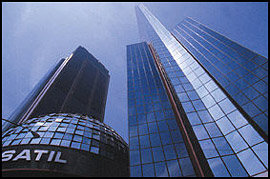 Banking Banking
Not all free market reforms have gone as smoothly as planned, though. When banks were passed from government control to private investors under the Salinas administration, the poorly-regulated changeover resulted in banks collapsing en masse when the peso crashed, not to mention a swathe of white-collar scandals. Why? Many banks were sold to inexperienced cronies and friends of the former administration, whose managing procedures did not meet international regulations, and could not withstand the effects of the economic crisis. The government opted to bail out the banking system, to the tune of $100 billion. Though the IMF still considers the sector one of the economy's weak points, recovery has set in at a fast pace. The government assigned the Bank Savings Protection Institute (IPAB) to take over the ailing banks, and oversee the injection of funds into them to make them ready for resale and sell off assets of unpaid loan portfolios.
IPAB bond sales took off this year, and following a costly restructuring of Serfin bank, the institution announced the sale of the bank's assets to Banco Santander Mexicano that had made a $1,560 million bid. As a result of this, Banco Santander of Spain has become the third-largest bank in Mexico, thereby reinforcing its leadership in Latin America. This move represents an important step in the consolidation wave that is sweeping over the industry. Spain's BBVA, Banco Santander's major competitor, is now more impelled than ever to finalize its planned merge with the N° 2 Mexican bank, Bancomer . The latter has also received a hostile proposal to merge with its main local competitor, N° 1 Banamex , backed by the most nationalistic sectors. With this in view, Marcos Martinez Gavica of Banco Santander Mexicano says he sees no more than six or seven banks holding an important role in the near future.

The impressive track record of the Mexican Stock Exchange, or the Bolsa Mexicana de Valores , is also a sure sign the economy is attractive to onlookers. Up over 70% last year, it registered among the world’s fastest growing bourses. Bolsa President Manuel Robleda Gonzalez de Castilla says price to earnings ratios of many stocks listed on the Bolsa are much lower than in U.S. equity markets, making them fetching to shareholders. The Bolsa is expected to break new barriers this year as well, fueled by bullish sentiment over the prosperous economy, which Finance Minister Jose Angel Gurria assures will surpass growth of 4%.
|
Citibank , the first U.S. bank to enter Mexico, and Scotiabank of Canada have also staked out territory here, focusing on corporate banking. Scotiabank owns a 10% stake in financial group Inverlat , and is studying possibilities in conjunction with IPAB, which has injected funds into Inverlat twice, to increase its stake to 55%.Partnerships between multinationals and Mexican companies in other financial services have flourished for several years. Most recently, Mondex International sought alliances with the nation's most important commercial banks to offer them the latest in technology, credit cards with chips, or "smart cards."
International corporations offering services ranging from consulting to real estate, such as KPMG , Deloitte & Touche and Ernst & Young have also found their niches in Mexico. For instance, Ernst & Young, one of the Big Five, has had a 40-year partnership with Mexican company Mancera, allowing it to have local market expertise mixed with the global technology, training and administration of a multinational. According to company President and General Director, Victor Aguilar Villalobos , Ernst & Young : Ernst & Young's mission is very clear: " to combine throughout the world with firms that enjoy great prestige and have a thorough penetration in the local market "Understanding and actively participating in the globalization processes is essential, and of course, large investments in technology must be made to successfully confront the new internet economy", he says.
During the current administration, efforts to reform banking laws to liken international standards assure history won't repeat itself. New laws on bankruptcy and on loan guarantees are expected to be passed this year, and collateral and deposit laws have already taken effect, to make the legal framework more transparent. Lending by commercial banks, which became defined by stringent requirements and high interest rates, has become more accessible in the last few years, signaling recovery. National trade bank Bancomext , also expects credit to become more readily available as the sector heals. The bank serves mostly small and medium sized companies, providing financial support and market advice, according to Bancomext General Director Enrique Vilatela . In three years time, Vilatela expects the banking sector to become an important muscle in the economy, and invites potential partners to support the initiative. With 62 years of experience, the most challenging objective the bank faces is adapting to the ever-changing conditions of the Mexican market. Right now, the bank is focusing on getting small firms to realize the potential benefits of starting up export operations. Bancomext as well as CANACINTRA President Yañez believe further fiscal reforms are necessary though, since Mexico has one of the lowest rates for tax collection in Latin America. "Mexico needs an integral and permanent levying regulation that includes every single Mexican that is able to pay taxes," Yañez stressed. However, long strides have been taken to ensure that step by step, the political economy is moving in the right direction. |

